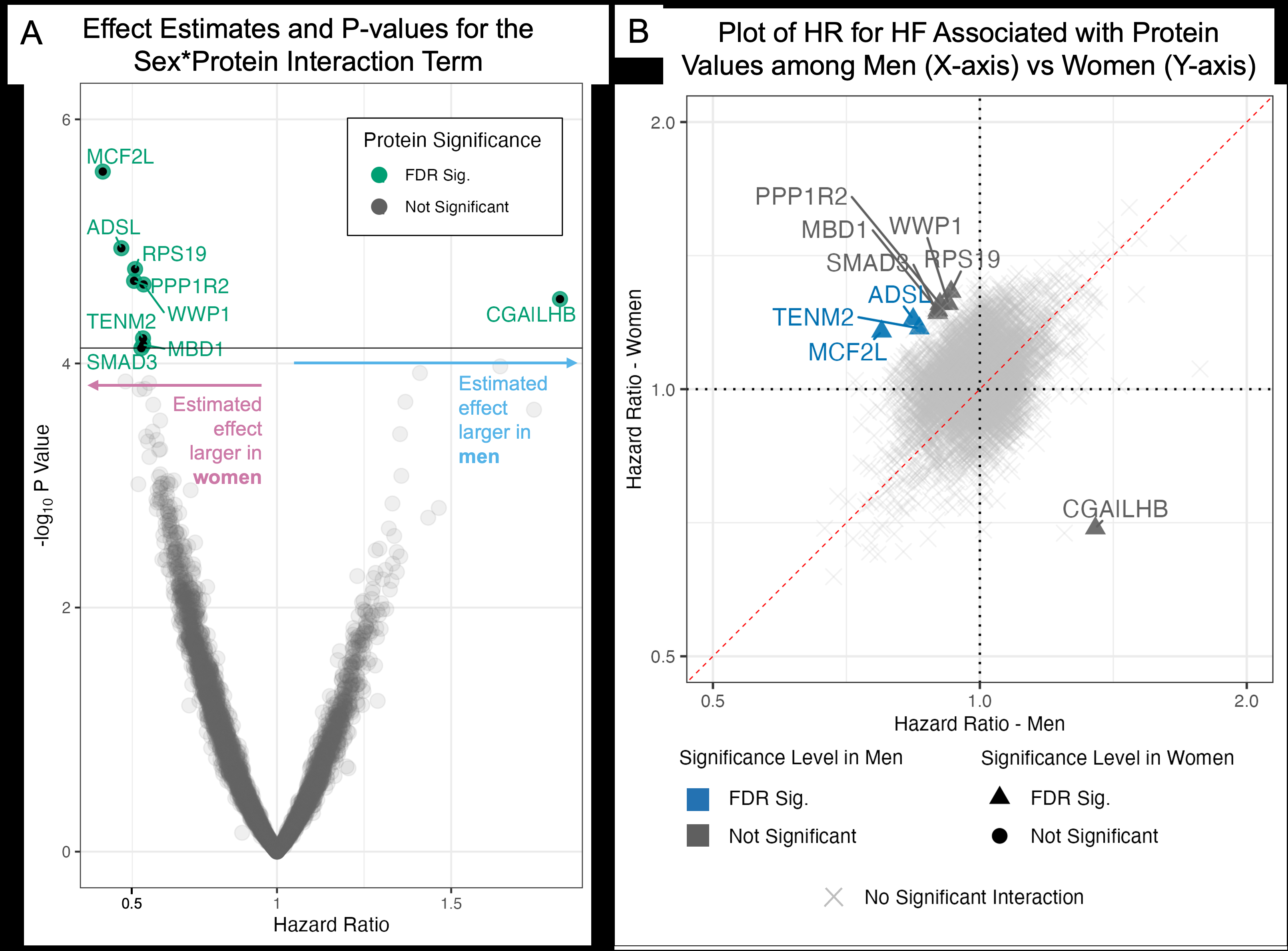Final ID: P2107
Sex-Specific Associations of Plasma Proteins with HF Risk: The Atherosclerosis in Communities (ARIC) Study
Abstract Body: Introduction: Heart failure (HF) epidemiology and pathophysiology differ by sex. Large scale plasma proteomics offers promise to provide insight into biologic mechanisms underlying sex-based differences, but limited data is available.
Hypothesis: A subset of circulating proteins will differentially associate with incident HF in women compared to men.
Methods: We examined 10983 participants in the community-based ARIC cohort study who attended study Visit 2 (1990-92), were free of HF, and had aptamer-based proteomic measurements (SomaLogic; 4955 aptamers corresponding to 4715 unique proteins). We used multivariable Cox regression to test the association of plasma proteins with HF. Models were adjusted for age, BMI, eGFR, Black race, smoking status, visit center, CHD, diabetes, and hypertension, and included sex interaction terms with protein measurement and all other model covariates except visit center. For proteins with a significant sex*protein interaction after FDR correction for multiple testing (FDR corrected p<0.05), we fit stratified models for men and women and fit interaction models to test for differential associations of protein measures with HF risk factors by sex.
Results: Among 4935 men (mean age 57±6 years, 20% Black race) and 6048 women (57±6 years, 25% Black race), 369 and 298 incident HF events occurred over 10-year follow-up respectively. Effect modification of sex on the association of protein level with incident HF was observed for 9 proteins, all of which were significantly associated with HF in women, while 3 showed directionally opposite associations with HF in men in stratified models (Figure). In addition to known sex hormones (CGA/LHB), the proteins reflected processes related to inflammation, including immune regulation (RPS19) and TGF-beta signaling (SMAD3, WWP1); purine and cellular energy metabolism (ADSL, PPP1R2); and wound healing (MCF2L). ADSL was also more strongly associated with BMI among women than men. ADSL is expressed in adipose, cardiac, and skeletal muscle tissues, and has shared pQTLs with eQTLs in these tissues.
Conclusions: High throughput proteomics identifies circulating proteins differentially related to HF risk in women versus men. These findings highlight potential differential roles for specific inflammatory pathways and alterations in cellular metabolism to HF development in women. Further studies of ADSL as potentially linking obesity, metabolic dysfunction, and HF in women are warranted.
Hypothesis: A subset of circulating proteins will differentially associate with incident HF in women compared to men.
Methods: We examined 10983 participants in the community-based ARIC cohort study who attended study Visit 2 (1990-92), were free of HF, and had aptamer-based proteomic measurements (SomaLogic; 4955 aptamers corresponding to 4715 unique proteins). We used multivariable Cox regression to test the association of plasma proteins with HF. Models were adjusted for age, BMI, eGFR, Black race, smoking status, visit center, CHD, diabetes, and hypertension, and included sex interaction terms with protein measurement and all other model covariates except visit center. For proteins with a significant sex*protein interaction after FDR correction for multiple testing (FDR corrected p<0.05), we fit stratified models for men and women and fit interaction models to test for differential associations of protein measures with HF risk factors by sex.
Results: Among 4935 men (mean age 57±6 years, 20% Black race) and 6048 women (57±6 years, 25% Black race), 369 and 298 incident HF events occurred over 10-year follow-up respectively. Effect modification of sex on the association of protein level with incident HF was observed for 9 proteins, all of which were significantly associated with HF in women, while 3 showed directionally opposite associations with HF in men in stratified models (Figure). In addition to known sex hormones (CGA/LHB), the proteins reflected processes related to inflammation, including immune regulation (RPS19) and TGF-beta signaling (SMAD3, WWP1); purine and cellular energy metabolism (ADSL, PPP1R2); and wound healing (MCF2L). ADSL was also more strongly associated with BMI among women than men. ADSL is expressed in adipose, cardiac, and skeletal muscle tissues, and has shared pQTLs with eQTLs in these tissues.
Conclusions: High throughput proteomics identifies circulating proteins differentially related to HF risk in women versus men. These findings highlight potential differential roles for specific inflammatory pathways and alterations in cellular metabolism to HF development in women. Further studies of ADSL as potentially linking obesity, metabolic dysfunction, and HF in women are warranted.
More abstracts on this topic:
Age-linked PVAT dysfunction and sex-specific signatures: Unveiling the pathobiology and phenotypes associated with CABG graft patency
Ryu Ji-yeon, Jang Eui Hwa, Shin Yejin, Youn Young-nam
A Novel Echocardiography Risk Score Predicted Mortality In Patients With Heart Failure With Preserved Ejection Fraction.Iwakura Katsuomi, Yoshio Yasumura, Hikoso Shungo, Okada Katsuki, Nakatani Daisaku, Sotomi Yohei, Sakata Yasushi, Tanaka Nobuaki, Okada Masato, Okamura Atsunori, Heitaro Watanabe, Seo Masahiro, Hayashi Takaharu, Yano Masamichi, Yamada Takahisa

